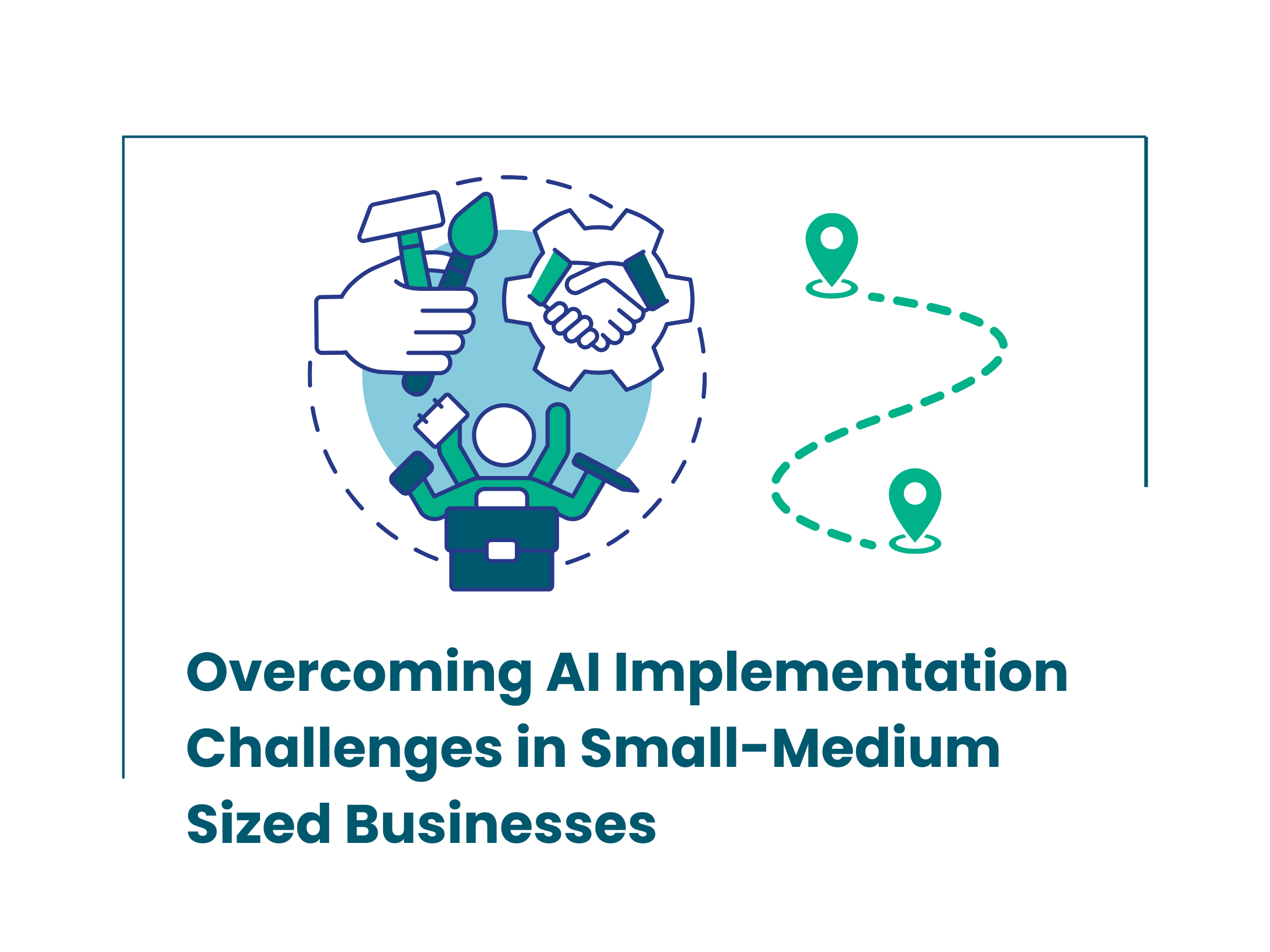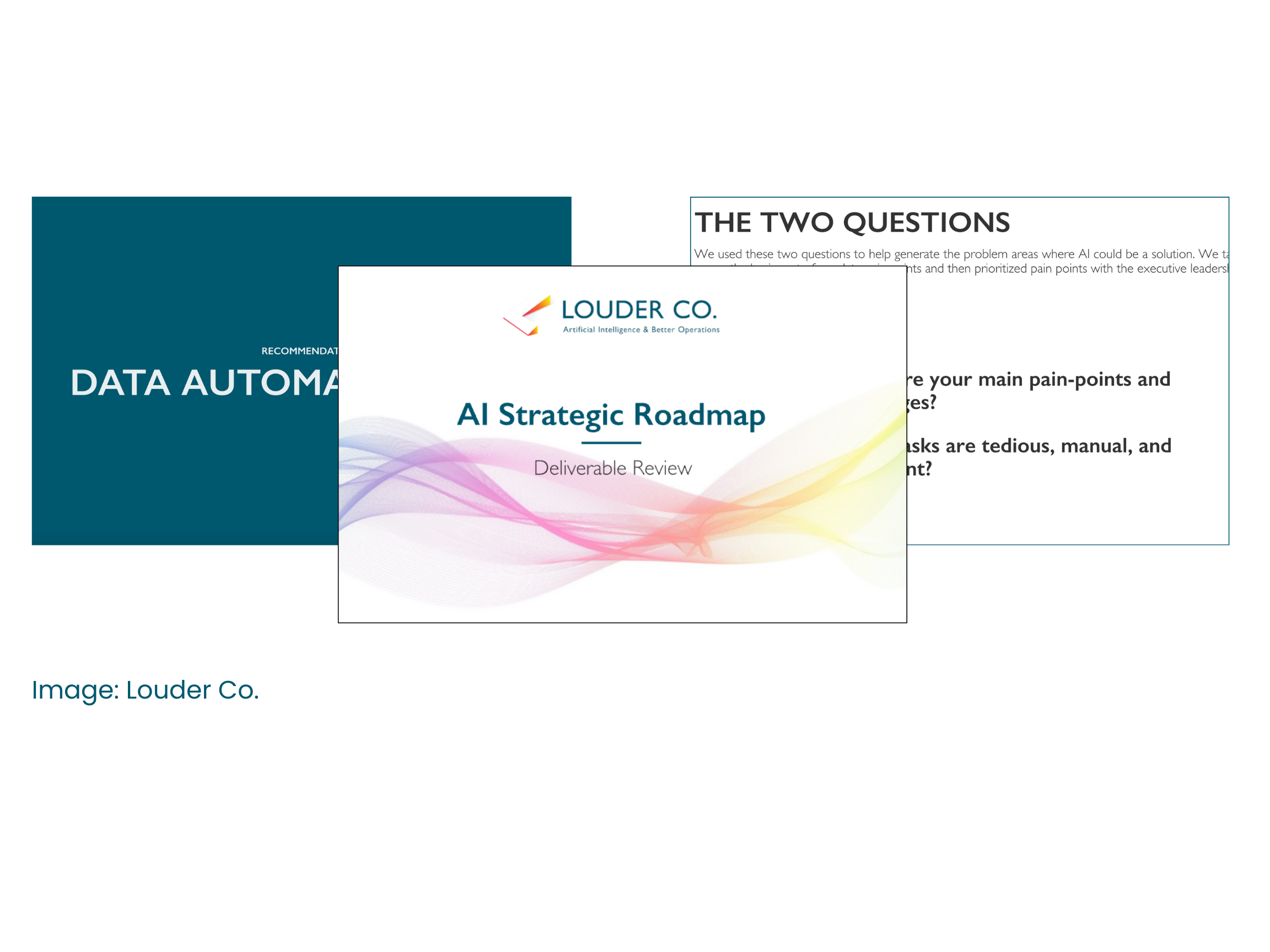Overcoming AI Implementation Challenges in Small-Medium Sized Businesses

Contents

Artificial Intelligence has emerged as a transformative force across numerous industries, establishing itself as a cornerstone of contemporary business strategies. By offering unparalleled opportunities for growth, efficiency, and innovation, AI enables companies to streamline operations, enhance customer experiences, and gain a competitive edge. However, while large enterprises typically possess the financial and technical resources to manage the intricacies of AI implementation, small and medium-sized businesses (SMBs) often encounter unique challenges that can appear overwhelming.
The barriers to AI adoption for SMBs include limited budgets, a scarcity of specialized talent, data management issues, and the complexities of integrating new technologies with existing systems. Despite these hurdles, SMBs can successfully navigate the complexities of AI implementation by adopting a well-structured approach (The AI Journey) and completing a Strategic Roadmap.
In this blog, we’ll explore these challenges and the actionable insights for business owners aiming to leverage AI. By following these guidelines, SMBs can harness AI’s potential, driving significant improvements in efficiency and innovation while maintaining a competitive edge in their respective markets.
Understanding the Common Challenges
Limited Resources & Lack of Expertise
One of the foremost challenges SMBs face when implementing AI is the constraint on financial and human resources. Unlike large enterprises, SMBs often operate with tighter budgets, making it difficult to invest in custom AI technologies and infrastructure. The initial costs of acquiring AI solutions can also be significant, encompassing not only the purchase of software and hardware, but also the costs associated with customizing these solutions to fit specific business needs. Furthermore, the financial burden does not end with the initial purchase. Maintenance, regular upgrades, and scaling of AI systems require ongoing investment, which can strain the limited financial resources of SMBs.
In addition to financial constraints, SMBs often face challenges in allocating sufficient human resources to AI projects. AI implementation requires specialized skills in areas such as machine learning, data management, and change management. However, SMBs typically have smaller workforces where employees wear multiple hats and juggle various responsibilities. This situation makes it difficult to assign staff exclusively to AI-kick off projects without compromising other critical business functions. The need to balance everyday operational demands with new innovative endeavors further complicates the allocation of human resources. As a result, SMBs may struggle to develop AI initiatives, hindering their ability to fully leverage AI's potential for business transformation.
Data Management
Effective AI systems rely heavily on high-quality data, which serves as the foundation for accurate predictions and actionable insights. However, many businesses face significant hurdles in data management that can impede the success of their AI initiatives. One primary challenge is data collection, as data may be scattered across various departments, stored in different formats, or exist in unstructured forms that are difficult to harness. Without a systematic approach to data collection, SMBs may find it challenging to compile a comprehensive dataset necessary for training AI models. Once data is collected, reliable and scalable data storage becomes a concern. Traditional storage systems may not be adequate, and investing in data storage solutions can be cost-prohibitive. Furthermore, managing the storage infrastructure requires technical expertise, which might be lacking within the organization.
Data cleaning is another critical aspect of data management that presents challenges. Data from various sources can be incomplete, inconsistent, or contain errors. Cleaning this data involves removing duplicates, correcting inaccuracies, and filling in missing values to ensure that the dataset is suitable for AI processing. This process can be time-consuming and requires meticulous attention to detail, which can strain the limited resources of SMBs. The quality of data directly impacts the performance of AI systems; poor data quality can lead to inaccurate AI predictions and insights, undermining the value of AI initiatives.
Integration with Existing Systems
Integrating AI solutions with existing business systems and workflows is a complex and time-consuming endeavor, particularly for enterprises operating on legacy systems. These older systems, typically built on outdated architectures, may not be compatible with the advanced requirements of modern AI technologies. As a result, ensuring seamless integration necessitates meticulous planning and coordination. The process begins with a comprehensive assessment of the current infrastructure to identify compatibility issues and potential integration points. This assessment might reveal the need for substantial upgrades, such as updating software, enhancing hardware capabilities, or reconfiguring network setups to create an environment conducive to AI operations. Effective integration also requires significant cross-departmental collaboration to align AI initiatives with business objectives and workflows.

Overcoming Challenges With an AI Strategic Roadmap
Introducing AI into an enterprise can be daunting, given the numerous challenges involved. However, following a three-step process for a seamless AI journey can help SMBs overcome major setbacks. The first step of the AI Journey is AI Education, followed by AI Strategy and AI Execution. The AI Strategic Roadmap is developed during the AI Strategy phase, preferably in collaboration with a team of AI experts, to effectively mitigate common obstacles. A customized AI Strategic Roadmap is an essential first step in evaluating an enterprise's readiness, identifying AI opportunity areas, and outlining a clear and actionable plan for implementing solutions that drive innovation and growth.
An Expert’s Assessment of Current Capabilities and Enterprise Readiness
Partnering with an AI consultancy brings a team of experts who will meticulously assess your enterprise’s current capabilities and readiness for AI implementation. The goal is not to overwhelm your teams with overly advanced solutions, but to understand the existing programs and systems that could be integrated or enhanced with AI. These experts will conduct a thorough evaluation of your technological infrastructure, data quality, and talent resources, identifying gaps and areas for improvement.
By aligning AI strategies with your current operations and future goals, the consultancy ensures a seamless transition, making AI adoption a natural progression rather than a disruptive overhaul. Additionally, using AI experts allows your company to focus on its core competencies while the experts handle the complexities of AI integration. This tailored approach helps maximize the benefits of AI while ensuring that your teams can adapt comfortably to new technologies, driving efficiency and innovation without unnecessary complexity.
AI Opportunities Prioritized By Level of Impact
During an AI Strategic Roadmap engagement, an AI consultancy will prioritize AI opportunities based on their potential impact, ensuring that resources are allocated to initiatives that will deliver the greatest value. The consultancy begins by conducting a comprehensive analysis to understand your enterprise's most significant pain points. This concludes with a summary of achievable projects that address the pain points, while also building support and momentum for larger AI initiatives. The proposed quick-win projects are clearly categorized by impact and effort so leaders can make clear decisions on next steps. Some examples of quick win projects include implementing Microsoft 365 Copilot, data management, and a comprehensive technology assessment.
This approach ensures that AI projects are not only financially feasible but also strategically aligned with your business objectives, maximizing efficiency and driving meaningful results. By focusing on high-impact opportunities first, the consultancy helps your enterprise achieve measurable benefits quickly, paving the way for more extensive AI adoption in the future.

Receive a Strategic Roadmap Detailing Your AI Journey
An AI consultancy will provide a Strategic Roadmap detailing your AI journey, designed to guide the execution of AI projects with precision and clarity. This comprehensive roadmap includes a calendar timeline and project duration, setting clear expectations for each phase of implementation. The Strategic Roadmap engagement, along with the proposed AI projects, will address key implementation challenges with the support of AI experts. These challenges include integration with existing systems, ensuring seamless data management, and assisting internal teams in preparing for and implementing change management processes. By addressing these critical areas, the roadmap ensures a smooth transition and successful adoption of AI technologies, allowing your business to harness the full potential of AI while minimizing disruptions and maximizing efficiency.
AI is attainable to any business that has an adequate vision and strategy in place. If your enterprise needs help embarking on its AI Journey, Louder Co.’s team of experts is here to help! Contact Louder Co. today to get the conversations started.


